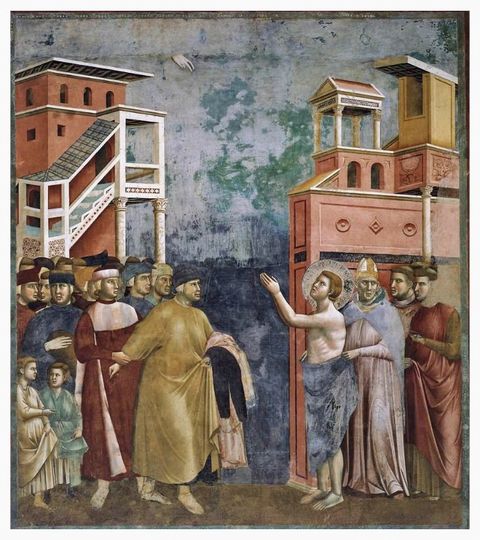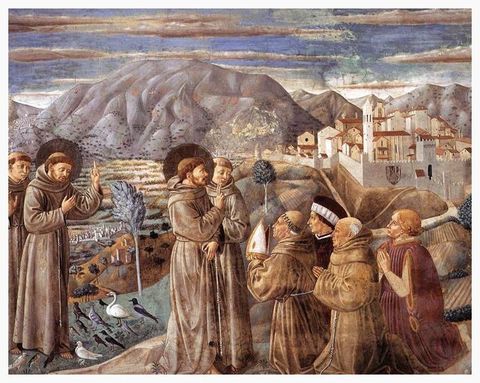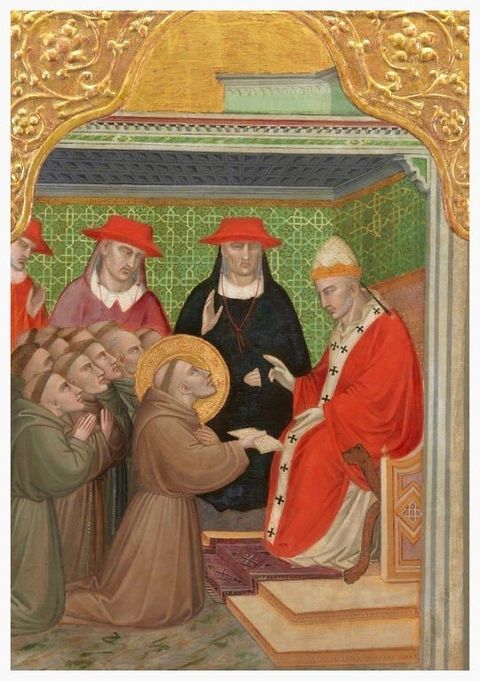Monks or Friars - what's the difference?
We are always told that the Franciscans are not monks, but friars. So what is the difference?
When St Francis at the end of his life wrote a Testament for his Brothers, he began by recalling the process by which he came to his conversion of life, how he came ‘to do penance’. He recalled his meeting with the leper, how he overcame his abhorrence and embraced him. He concluded this account with the words, ‘and then, after hesitating a little, I left the world’. This phrase, ‘to leave the world’, in the language of the time, meant ‘to enter a monastery’, or at least ‘to live like a monk’. ‘The world’ meant everything outside of the monastery, and to ‘leave it’ therefore meant to enter upon a consecrated religious life like the religious orders existing at that time. That this was clear to him from the beginning, even before anyone else joined him, is evident from the fact that he refused to appear before the civil court when his father cited him to appear there, because as a ‘servant of God’ the civil court did not hold jurisdiction over him. So it was before the Bishop that he argued his case.
But while he was quite sure that he wanted to ‘leave the world’, he was equally certain that he wanted a life quite distinct from that of any of the existing Orders. His earliest biographer (Celano) wrote that Cardinal John of St Paul was unable to get Francis to join any of the existing forms of monastic or eremitical religious life, not because he despised them, but because he strove for something different, something beyond that kind of life-style. In fact his relations with existing church organisations and structures seem to have been excellent: the Benedictine monks gave him for his use properties like the Porziuncula chapel and seem to have understood and respected his form of life. The Bishop of Assisi remained his protector always. When the first group of Friars sent by St Francis to England arrived at the English Channel, we read that their fare across was paid by the monks of Fécamp who met all their needs.
So what made the life that St Francis was striving to live so distinctive, so different from that of the monks? The difference between monk and Friar was almost one of kind. Because they were both forms of consecrated religious life they were bound to have some elements in common: the vow of celibate chastity which made possible the community life of Brothers, the vow of poverty which made the life of the individual Brother austere, and the vow of obedience which made possible the discipline of unity of purpose. But the monk was supposed never to leave his cloister: he left the world by leaving the dwellings of men and joining a monastery where he hoped to spend the rest of his life. The Friar as far as possible was to have no cloister to leave. What was a virtue for the monk, the stability of a life-long local community (the abbey), was a vice for the Friar, who had to be ready to leave his community of the moment, up sticks, and move on to pastures new at the bidding of his superiors. For the monk poverty was the mark of his detachment from things, while the abbey inevitably grew rich, for the Friar the whole Order was poor and held on to nothing. For the monk his abbey, originally at least, was remote from men, although in the course of time inevitably a whole town might well grow around it, for the Friar his dwelling was right among men, among the poorest people of society, in the poorest parts of the existing towns. The monk fled the company of ordinary folk, the Friar lived among them and preached to them.
This difference of life-styles led to a difference in the observance of poverty: the Franciscans as a body and as an Order renounce any ownership of material goods. They have to use them, but they do not own them. Everything they use is on loan and therefore has to be cared for and shared with the poor. Legally, the ownership of all the property used by the Friars is vested in the Holy See. This has made the Friars natural missionaries, leaving their home territories to bring the Gospel to the furthest corners of the earth. Saint Francis wrote a Rule of Life where for the first time there is a whole chapter about ‘those who wish to go among the Saracens and other infidels,’ and to this day the Franciscans are the largest missionary Order in the Church.
When Saint Francis wanted to give a name to the members of his Order he called them fratres minores, or lesser (younger, lowlier) brothers, living in humble service to society, not claiming leading roles, but rather the lowest places of service. The Latin word fratres has passed into English as ‘friars’, a distinctive word: Friars not monks. Please.



